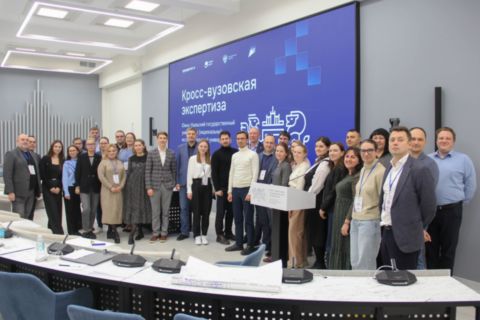October 2nd to 3rd, 2025, a cross-university peer review was held at South Ural State University. Representatives of the Social Centre team, together with the SUSU Transformation Team, analyzed the results and promising areas of work at South Ural State University in terms of their alignment with the strategic objectives of the Priority 2030 Program.
The cross-university peer review is taking place across Russia, involving over 100 universities from the Main and Far Eastern Tracks. The Ministry of Science and Higher Education of the Russian Federation is the main organizer of the review. The primary goal of the cross-university review is to provide an independent, objective expert assessment of the implementation of development programs of universities participating in the Priority 2030 Program.
The experts noted our universitys team's high level of engagement in transformation processes, as well as the university's highly professional research base, which is focused on building collaboration with industrial partners—our region's largest enterprises. SUSU's current partners include PAO Chelyabinsk Forge-and-Press Plant (OOO Robot Plant), PAO Magnitogorsk Iron and Steel Works, AO KONAR, and other technological leaders in our region.
The university team also included representatives of strategic partners working with the experts.
Participant in the cross-university peer review, representative of SUSU’s industrial partner PAO ChKPZ, Deputy Director for Production of PAO ChKPZ Viacheslav Egorov:
"Today, PAO ChKPZ has established very productive collaboration with students in terms of effective training of engineering personnel. With SUSU's assistance, we are successfully solving two types of engineering problems: those our company faces today and those we plan to solve in the near future. For example, developing new volumes in the robotics market.
We have significant growth potential associated with the work of the SUSU's laboratories (and not only the production facilities of the Faculty of Mechatronics and Robotics). The university has what the company lacks: scientific base and expertise. The expertise of the SUSU's research and production teams allows us to effectively address production issues and plan future collaboration.
I see prospects for further collaboration in the training of highly qualified engineering personnel, who are currently in great demand not only in our region but throughout Russia. This primarily includes training integrators, designers, and technologists.
These are precisely the specialties that advance Russia's technological sovereignty. We expect that the joint training of engineers at ChKPZ and SUSU will bear fruit in the near future.
We are very much counting on the university's support. I see great potential for cooperation between the university and our company. The university's expertise, as well as the knowledge and skills of its academic staff and researchers, are crucial. All of this is crucial for achieving the joint goals that ChKPZ sets for SUSU as a research institute, and therefore for the joint advancement of the university and our company toward technological leadership."
It is worth noting that during their visit to South Ural State University, the experts not only participated in the strategic session but were also taken on tours around the university's leading departments, such as the Quantum Engineering of Light Laboratory. They learned about key developments in artificial intelligence in industry, multiphysics modelling and digital twins, industrial robotics, sensors, and quantum metrology.
On-site cross-university peer review plays a crucial role in analyzing universities' resources and implementing their strategic projects.
Aleksey Kuzmin, an expert at the Federal State Budgetary Institution "Sotsiotsentr" (Social Centre) and Deputy Vice-Rector for Education at Tomsk Polytechnic University, commented on the changes in the specifics of expert work and the features of cross-university peer review at SUSU:
"In previous years, project-analytical sessions at universities took a different format. This was related to developing a target model for a university and exploring possible ways to refine this target model. Today, in peer-to-peer review, we primarily share experiences.
A large pool of experts from across our country participates in the review (SUSU, among others, has such an expert). When visiting universities today, we primarily focus on sharing best practices: who has seen what and how this can be used to improve the university's framework.
The second part of the peer-to-peer review is developing a draft roadmap for the near-future, medium- and long term.
It's worth noting that the SUSU teams have truly come close to creating a draft roadmap in this short period of time.
Already on day one of the session, a deep interest in the process was obvious in the groups. This was evident in the teams' keenness to approach the situation from a positional perspective and formulate questions. By the end of day one, the SUSU teams delved deeply into the problem and were able to identify barriers to the university's development. On day two, the transformation team members, based on the identified barriers and under the guidance of experts, were able to formulate thesis statements for a future draft roadmap."
Evgeniy Belousov, Head of the Strategic Development at the SUSU Project Management Office, noted:
"Participating in this review was a very valuable experience for us and our colleagues from Moscow, St. Petersburg, and Tomsk. The review was intense and quite productive.
Each of the four teams, through active discussions, proposed their own original solutions in the following areas: university model, team and leadership, technological leadership, and new personnel.
The discussion generated interesting ideas. We would like to thank our colleagues for their new concepts for promoting the products of our strategic technology projects. I hope that the development of these proposals will allow us to use the solutions we find to create a prototype for a new roadmap for four areas of the SUSU development."
The results of this cross-university peer review will ultimately serve as the basis for the university's new roadmap.
Since 2025, the Russian Ministry of Education and Science's Priority 2030 Program has been implemented as part of the Universities for a Generation of Leaders federal project within the Youth and Children national project.




